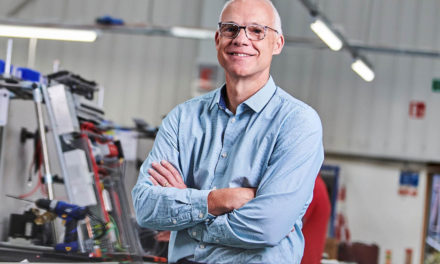Empowering innovation
Foreword: Policy Connect
A new report co-chaired by Chris Skidmore MP, former Universities and Science Minister, and Lord Norton of Louth highlights the important role that universities can play in boosting regional economies and levelling up the UK.
By Natascha Engel, CEO of Policy Connect.
Above: A battery production line at WMG, University of Warwick Credit: WMG, University of Warwick
The manufacturing and engineering sectors have a critical role to play in levelling up. They work across all regions and nations of the UK. They create jobs, boost local economies and attract investment. This gives manufacturing and engineering a huge opportunity to help deliver the national levelling up ambition.
A year-long inquiry brought together Parliamentarians, universities and businesses from across the UK.
The resulting report, Empowering Innovation, puts forward practical policy proposals to help the government level up.
Building on local strengths to innovate and grow
The report calls for government to empower regional leaders through Regional Innovation Deals. These Deals would use devolved funding programmes to deliver innovation projects and build capacity for innovation.
The West Midlands Combined Authority is an example of such a devolved funding programme which has delivered exciting results. The authority launched its own regional industrial strategy, which highlighted specific strengths of the region and identified ways to build on them.
The strategy recognised the importance of regional innovation centres such as the Warwick Manufacturing Group (WMG) set up by Lord Bhattacharyya.
The group now leads the way in manufacturing electric vehicles and ultra-light rail – tackling simultaneously the two major challenges of net zero and levelling up. The WMG brings together academia with the public and private sectors and drives innovation in applied science, technology and engineering.
Investment from the authority has attracted private sector investment too. Businesses across the West Midlands invested £2.3bn in research and development in 2016, representing 10% of all business R&D expenditure in the UK. This shows how a targeted, regionally-led programme can deliver brilliant results for the local area.
Academia-industry collaboration
Empowering Innovation found that this successful academia-industry partnership is unfortunately too rare. The report calls for universities to support greater transitions between academia and industry, for instance through industrial fellowships and secondments. This would generate two-way knowledge exchange to develop both academic excellence and business success.
Some examples of programmes like these include the Fraunhofer Society in Germany and Industrial Doctorates and Industrial Cooperative Awards in Science and Engineering (ICASE) Studentships.
The report also calls for the expansion of the Knowledge Transfer Partnership scheme. This scheme sits under Innovate UK and covers smart innovation funding. For the manufacturing and engineering sectors, implementation of this recommendation would bring students and graduates into industry to deliver programmes and implement change.
Including SMEs in the mix
The report also found that SMEs struggle to take part in innovation and to access R&D funding. This is because the system is inaccessible, complex to navigate and difficult to engage with.
To assist SMEs, the report recommends the British Business Bank establishes new programmes to promote SME innovation loans as part of its new Regional Investment Funds announced in the Levelling Up White Paper. It also recommends the government establishes new regional innovation support services and enhances the existing R&D Tax Credit Scheme to foster SME and university innovation activity.
The vast majority of the UK manufacturing sector is made up of SMEs. In other roundtables hosted by Policy Connect, we hear common barriers for SMEs are the lack of initial funds to invest in innovation and new technologies.
Enhancing tax credits, regional innovation support services and SME and university innovation loans would allow them to invest in new processes, skills and technologies.
Close partnerships between academia, business and industry can be a catalyst for regional economic growth through innovation, research and development and help the UK achieve our levelling up ambitions.
As ever, our report emphasises that collaboration is an essential ingredient for innovation. We all know it, but these are the steps that we can take to make it happen. l
About Policy Connect
Policy Connect is a cross-party think tank. We specialise in supporting parliamentary groups, forums and commissions, delivering impactful policy research and event programmes by bringing together parliamentarians and government in collaboration with academia, business and civil society to help shape public policy in Westminster and Whitehall.
Our work focuses on five key policy areas: Education and Skills; Industry, Technology and Innovation; Sustainability; Health; and Assistive and Accessible Technology.
We are a social enterprise and are funded by a combination of regular annual membership subscriptions and time-limited sponsorships. We are proud to be a Disability Confident and London Living Wage employer, and a member of Social Enterprise UK.
For more information, visit: www.policyconnect.org.uk







